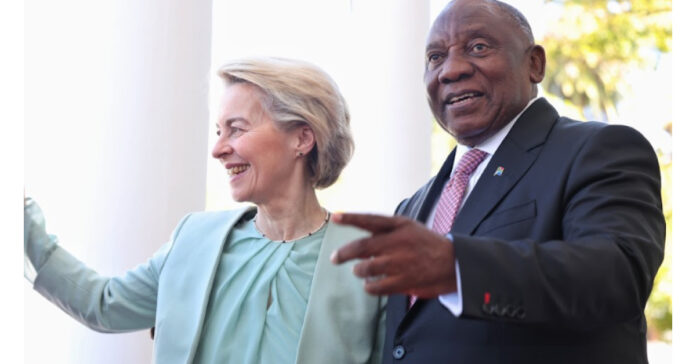The Western Cape’s Green Hydrogen roadmap, backed by EU organisations, is set to shape the sector in the province.
By Larry Claasen
THE European Union (EU) and its members are proving themselves to be reliable partners when it comes to funding South Africa’s Green Hydrogen ambitions, which come with a hefty price tag.
Many European countries view Green Hydrogen, the process of creating hydrogen by using renewable electricity as a power source to electrolyse water, as a way to provide an environmentally friendly source of energy.
EU organisations fund SA’s R319 bn hydrogen plan with €4,7 bn boost
The South African government sees it as a major opportunity, and according to its Green Hydrogen Commercialisation Strategy (GHCS), it could add 3,6% to GDP by 2050 and create 370 000 jobs.
For this to happen, however, it will have to invest R319-billion into the emerging industry.
The good news for South Africa is that the EU has committed to financially supporting Green Hydrogen projects as part of the €4,7-billion (about R95,16-billion) Global Gateway Investment Package.
The announcement made by European Commission President Ursula von der Leyen and South African President Cyril Ramaphosa in Cape Town not only cements their economic partnership, but will eventually secure the EU’s access to a carbon neutral energy supply.
EU organisations cement EU–SA partnership & energy security
“With this package… we invest massively in projects that support the Just Energy Transition Partnership. For example, an investment platform that will boost Green Hydrogen, batteries, renewables – all strategic industries for the future. We know that others are withdrawing. So here, we want to be very clear with our message: We are doubling down with our support. We are here to stay.”
This package consists of EU grants (€303-million), leveraging loans from the European financial institutions (€4,4-billion) and South Africa’s development banks to support the strategic value chain.
The investment will concentrate on supporting South Africa’s Just Energy Transition (JET), strengthening connectivity infrastructure, and strengthening the domestic pharmaceutical industry.
Financing framework: grants, loans & technical assistance
The funding will boost the Green Hydrogen sector by establishing financing facilities to leverage public and private sector investments, and also provide technical assistance for hydrogen projects.
This funding announcement follows the EU saying in September 2024 that it will provide financial support worth R628-million (R11,9-billion) to develop the Green Hydrogen value chain.
A €100-million loan from the European Investment Bank (EIB) and matched by the Development Bank of Southern Africa (DBSA) comes in addition to the €400-million (R7,9-billion) financing announced at COP27 in 2022.
Diversified European support: SA-H2 Fund launch
The EU is not the only European entity supporting Green Hydrogen. In June 2023, the Netherlands, Denmark, and the South African government launched the SA-H2 Fund, which has the goal of providing a blended finance fund that will facilitate and accelerate the development of a Green Hydrogen sector and circular economy in South Africa.
The initial aim of the fund was to secure $1-billion (R18,5-billion) in funding, to be raised directly in South Africa or indirectly via other channels.
The SA-H2 Fund is supported by Climate Fund Managers (CFM), Invest International B.V. (II) of the Netherlands, Sanlam, the DBSA, and the Industrial Development Corporation of South Africa (IDC), in collaboration with other strategic partners.
Blended finance boost: CI3 backing for SA-H2 Fund
In February 2025, CFM announced that it had secured initial capital commitments of €150-million from European donors, which will go into its Climate Investor Three Fund (CI3), which in turn supports the SA-H2 Fund.
Aside from the funding provided by the EU and other European institutions, Green Hydrogen is also being supported by the Western Cape Green Hydrogen Strategy and Roadmap, which aims to see the province become a production hub.
The roadmap has laid out a way for the generation and supply of 15 GW required for Green Hydrogen production in the Western Cape.
Western Cape export ambitions: 300 kt–420 kt green H2 targets
The province sees Green Hydrogen as a major potential export driver and as it aims to export between 300kt and 420kt green hydrogen as pure hydrogen or in derivative forms, such as green ammonia, methanol, or synthetic aviation fuel.
“The annual global demand for green hydrogen is estimated at 70 Mt to 154 Mt by 2030. Some forecasts project this increase to between 614 Mt and 660 Mt by 2050.”
The Western Cape hopes Green Hydrogen will add R57-billion to its economy, along with over 125 000 jobs in 2030.
Building energy independence and reducing Eskom reliance
It also sees the establishment of a Green Hydrogen industry as a way to foster its energy independence and reduce its reliance on Eskom.
